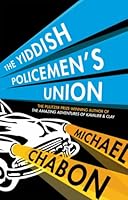 Image via Wikipedia
Image via Wikipedia
I thought more about while reading some Dennis Lehane and Michael Chabon too. Both write very dense texts - if that makes any sense. The words seem thick on the page and the sentences are flooded with details. This is from "Mystic River".
"Sean sat up on the old red bar stool and fingered the inside of the thick black vise, felt the oil and sawdust mixed in there..."
In that fragment what catches my eye is "sat up" which he uses rather than just sat. Sean is being told off by his father and it is reminiscient of parents telling kids to sit up straight. But also there is an echo in it that reminds the reader Sean is still a kid. Sitting up rather than just sitting, sprawling or any other way he could be on the stool. Then for the other elements in the scene both get two qualifiers - "old red" and "thick black".
The effect is more apparent in Michael Chabon who revels in detailed description. This from "House Hunting"
"The profusion of hats on the hatstand - three berets in the colors of sherberts, a tweedy homburg, a new-looking Stetson with a snakeskin band, several billed golf caps..."
Admittedly this is done to a different end in a story about a couple finding their place but there is a lot of detail there. Leaving aside the many different ways it uses to describe headgear, it made me think about how I use words. The story I am working on at the moment is just close to the end of its first draft. I'm going back now and adding in the bits I feel to be missing. Doubtless I'll oversteer but a lot of that will be caught when I turn it over to OWW and get so
 Cover of The Yiddish Policemen's Union
Cover of The Yiddish Policemen's Union
There is a point there, though. The Dennis Lehane book does suffer towards the end because it is so dense and layered and detailed. Sometimes I just wanted him to get on with the story and action rather that launch yet another detour into the history of the Plains and the Flats. Even towards the end when the story was winding up he couldn't stop.
The only story I've read of Michael Chabon's where it really worked well was the Yiddish Policemen's Union which was full of brilliant descriptions rather than just scene dressing. No way to belittle that, just sit at its feet and be impressed.
![Reblog this post [with Zemanta]](http://img.zemanta.com/reblog_e.png?x-id=b67ae5bc-e400-44cc-84c5-3dfa6da6d51a)

No comments:
Post a Comment